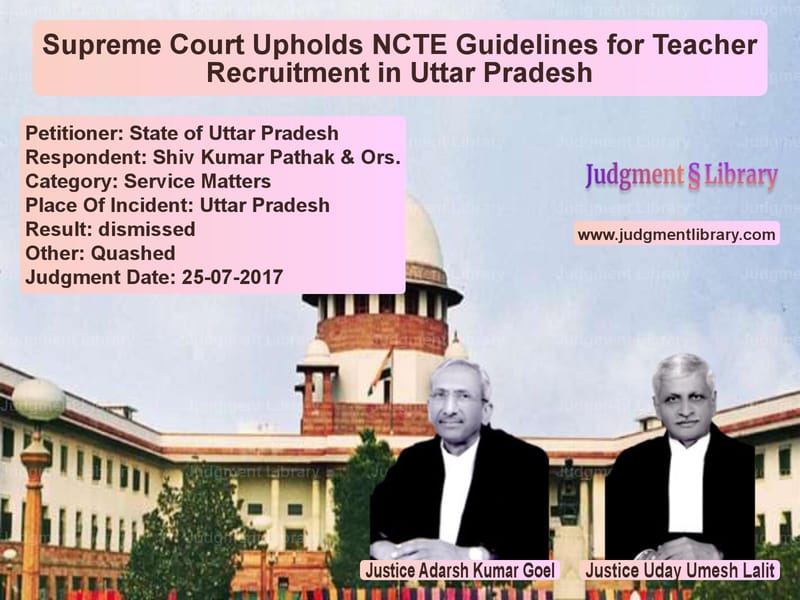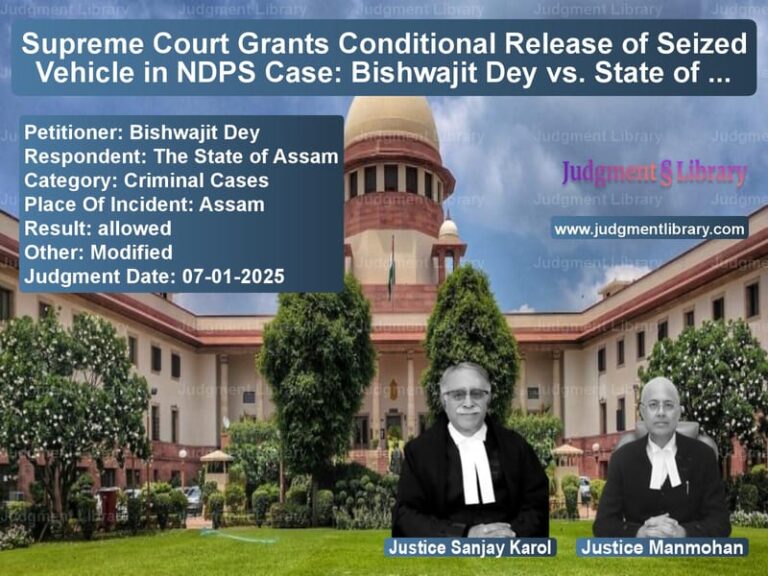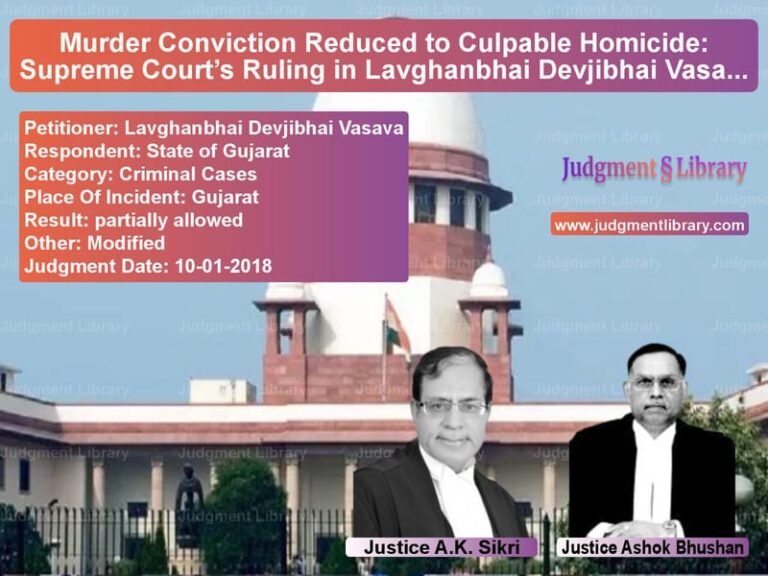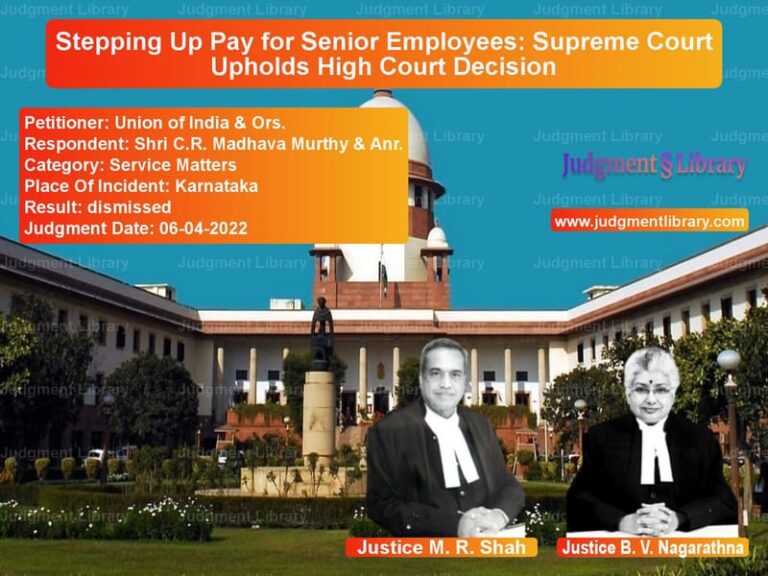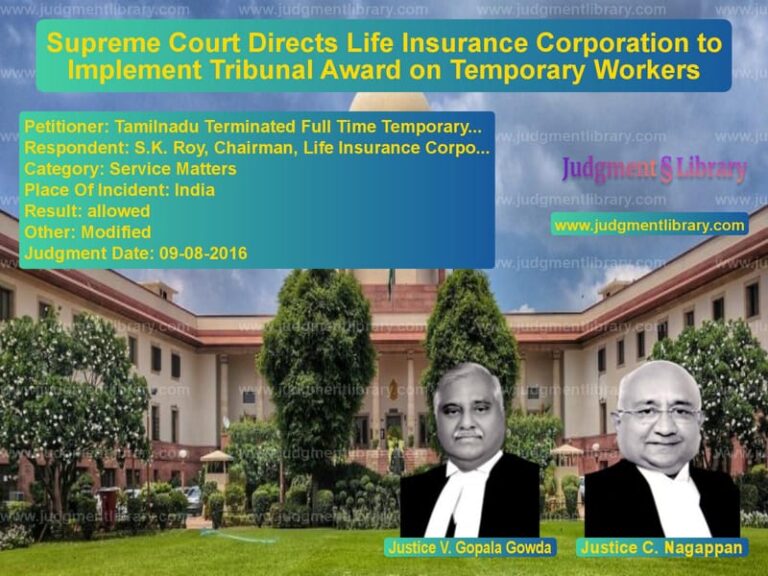Supreme Court Upholds NCTE Guidelines for Teacher Recruitment in Uttar Pradesh
The case of State of U.P. & Ors. vs. Shiv Kumar Pathak & Ors. revolves around a major legal challenge concerning teacher recruitment policies in Uttar Pradesh. The Supreme Court upheld the validity of the National Council for Teacher Education (NCTE) guidelines, ruling that states cannot prescribe qualifications that deviate from those set by the NCTE. This decision has significant implications for the recruitment of assistant teachers in the state.
Background of the Case
The legal dispute arose when the Uttar Pradesh government attempted to prescribe a selection process for teachers that was different from the guidelines issued by the NCTE. The key issues in this case were:
- Whether the NCTE guidelines are binding on state governments.
- Whether the Uttar Pradesh government’s recruitment policy, which deviated from the NCTE guidelines, was legally valid.
- Whether weightage to the Teacher Eligibility Test (TET) scores must be mandatorily followed in teacher recruitment.
Key Facts and Legal Provisions
The case primarily involved the following legal provisions:
- The Right of Children to Free and Compulsory Education Act, 2009 (RTE Act), which mandates certain qualifications for teachers.
- The National Council for Teacher Education Act, 1993 (NCTE Act), which empowers the NCTE to set standards for teacher education.
- The NCTE notifications dated August 23, 2010, and February 11, 2011, which prescribed minimum qualifications for teachers and the conduct of the TET.
- The Uttar Pradesh government’s 15th Amendment to the U.P. Basic Education (Teachers) Service Rules, 1981, which altered the teacher selection process.
Petitioners’ Arguments (State of Uttar Pradesh)
The state government argued:
- While the NCTE guidelines set minimum qualifications, states should have the autonomy to decide the method of recruitment.
- Weightage to TET marks was not a mandatory requirement under the NCTE guidelines.
- The government had introduced its selection criteria to prevent malpractices and corruption in the recruitment process.
- Only the eligibility criteria prescribed by the NCTE should be binding, and states should have discretion in determining the merit selection process.
Respondents’ Arguments (Candidates for Regular Teacher Posts)
The respondents, who were candidates affected by the recruitment process, contended:
- The state government’s policy change violated the NCTE guidelines and undermined merit-based selection.
- The TET was meant to ensure teacher quality, and its weightage in recruitment was essential to maintain standards.
- The 15th Amendment to the Uttar Pradesh rules violated the constitutional principle of federal supremacy by contradicting central laws.
- The state’s justification of curbing corruption was an excuse to manipulate the selection process.
Supreme Court’s Analysis and Judgment
The Supreme Court, in a judgment authored by Justices Adarsh Kumar Goel and Uday Umesh Lalit, ruled against the Uttar Pradesh government’s recruitment policy and upheld the binding nature of the NCTE guidelines.
1. NCTE Guidelines Are Binding
The Court held that the NCTE, as the academic authority under the RTE Act, has the power to prescribe qualifications for teachers:
“The state government does not have the authority to prescribe qualifications at variance with those set by the NCTE. The guidelines issued by the NCTE must be followed by all states.”
2. Weightage to TET Marks Is Not Mandatory
The Court clarified that while the TET is a mandatory qualification, giving weightage to TET marks in the recruitment process is not compulsory:
“The requirement of passing the TET is mandatory, but the method of selection is within the discretion of the state, provided it does not contradict the NCTE guidelines.”
3. State Governments Cannot Dilute National Standards
The Court rejected the Uttar Pradesh government’s argument that it could prescribe a different selection process, stating:
“The NCTE guidelines represent national standards for teacher recruitment. The state’s policy, which ignored these guidelines, is unconstitutional.”
4. Protection of Appointed Teachers
Recognizing that 66,655 teachers had already been appointed based on interim orders, the Court ruled:
“These appointments will not be disturbed. However, future recruitment must strictly adhere to the NCTE guidelines.”
Final Orders
The Supreme Court ruled:
- The Allahabad High Court’s decision striking down the 15th Amendment was upheld.
- The Uttar Pradesh government must comply with the NCTE guidelines in future recruitments.
- The teachers already appointed under the interim orders would not be disturbed.
- The state government was directed to issue fresh recruitment notifications following the proper guidelines.
Legal Implications of the Judgment
1. Federal Supremacy in Educational Standards
The ruling reaffirms that central laws prevail over state laws in matters where the central government has established standards.
2. Role of the NCTE in Teacher Recruitment
The decision strengthens the NCTE’s role as the ultimate authority on teacher education policies.
3. Protection of Merit-Based Selection
The judgment ensures that teacher recruitment remains transparent and based on uniform national criteria.
4. Balance Between Existing Appointments and Future Policy
The Court balanced the interests of already appointed teachers while ensuring future recruitments comply with legal requirements.
Conclusion
The Supreme Court’s ruling in State of U.P. vs. Shiv Kumar Pathak marks a significant victory for maintaining high standards in teacher recruitment. The decision ensures that all states follow a uniform policy prescribed by the NCTE and prevents arbitrary modifications to recruitment rules. The judgment upholds transparency, fairness, and quality in the education system, safeguarding the interests of students and teachers alike.
Don’t miss out on the full details! Download the complete judgment in PDF format below and gain valuable insights instantly!
Download Judgment: State of Uttar Prade vs Shiv Kumar Pathak & Supreme Court of India Judgment Dated 25-07-2017.pdf
Direct Downlaod Judgment: Direct downlaod this Judgment
See all petitions in Recruitment Policies
See all petitions in Public Sector Employees
See all petitions in Promotion Cases
See all petitions in Judgment by Adarsh Kumar Goel
See all petitions in Judgment by Uday Umesh Lalit
See all petitions in dismissed
See all petitions in Quashed
See all petitions in supreme court of India judgments July 2017
See all petitions in 2017 judgments
See all posts in Service Matters Category
See all allowed petitions in Service Matters Category
See all Dismissed petitions in Service Matters Category
See all partially allowed petitions in Service Matters Category

